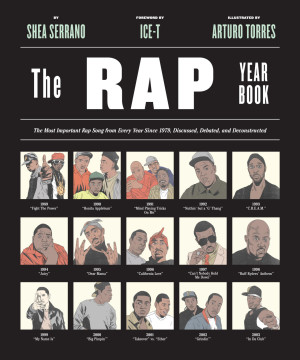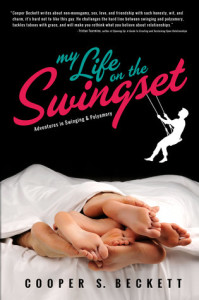If I had my way, I’d read a lot more than I do. A combination of my shortened attention span and the ever-present “busy”-ness of life has caused a bit of a decrease in the amount of books I consume. So far in 2016, I’ve made three worthwhile book purchases. Like most of my reading material, the purchases I’ve made speak to some of my passions: namely music (duh) and self-realization/exploration. Um, and sex. You may not get the same things out of these books that I did, but I recommend them each very highly. They’re as entertaining as they are informative.
 You like hip-hop? I love hip-hop. Did you like Grantland? I loved Grantland. So much so that while watching the Nova/Oklahoma game last night, my date and I spent a large chunk of the evening discussing how much we miss the site. Bill Simmons was a helluva curator of great writers, and Shea Serrano was a byline I remember popping up repeatedly on articles I liked. Shea’s a major hip-hop head, and The Rap Year Book: The Most Important Rap Song From Every Year Since 1979, Discussed, Debated and Deconstructed is a worthwhile addition to any music lover’s bookshelf. It’s the perfect combination of rap geek history and lighthearted music criticism, with enough personality to give the book a conversational tone not unlike Simmons’ excellent Book Of Basketball from a few years back. Serrano doesn’t take himself too seriously, which is a welcome relief from the heavy-handed, condescending tone many music writers (specializing in hip-hop as well as other genres) put across. You won’t agree with some of his choices, or even the alternate choices given as rebuttals at the end of each year (I certainly didn’t), and if you’re anything like me, you might do a slow fade as the discussions creep a little closer to the present (sorry, I’m an old head. What can I say?). However, you will be edutained, and you might be compelled to dust off some music you’ve forgotten (or, if you’re younger, check out some music you weren’t familiar with previously). Plus, there are footnotes. Glorious, glorious footnotes.
You like hip-hop? I love hip-hop. Did you like Grantland? I loved Grantland. So much so that while watching the Nova/Oklahoma game last night, my date and I spent a large chunk of the evening discussing how much we miss the site. Bill Simmons was a helluva curator of great writers, and Shea Serrano was a byline I remember popping up repeatedly on articles I liked. Shea’s a major hip-hop head, and The Rap Year Book: The Most Important Rap Song From Every Year Since 1979, Discussed, Debated and Deconstructed is a worthwhile addition to any music lover’s bookshelf. It’s the perfect combination of rap geek history and lighthearted music criticism, with enough personality to give the book a conversational tone not unlike Simmons’ excellent Book Of Basketball from a few years back. Serrano doesn’t take himself too seriously, which is a welcome relief from the heavy-handed, condescending tone many music writers (specializing in hip-hop as well as other genres) put across. You won’t agree with some of his choices, or even the alternate choices given as rebuttals at the end of each year (I certainly didn’t), and if you’re anything like me, you might do a slow fade as the discussions creep a little closer to the present (sorry, I’m an old head. What can I say?). However, you will be edutained, and you might be compelled to dust off some music you’ve forgotten (or, if you’re younger, check out some music you weren’t familiar with previously). Plus, there are footnotes. Glorious, glorious footnotes.
When David Bowie passed away last January, I realized that as much of a fan of his music as I was, I knew very little about the man, his life, or his artistic process. I set about to remedy that. There are a lot of books about Bowie (although interestingly-the man never sat down to write an autobiography. I’d have to assume there were tons of offers.) Marc Spitz’ (not the Olympic swimmer) Bowie: The Biography was a pretty breezy and informative read. Spitz is obviously (and openly) a super-fan. He describes a chance face-to-face meeting with the legend with the same air of astonishment and reverence that I would emit if I was to have run into Michael Jackson in the middle of the street (damn you, Alfonso Ribiero in the Pepsi commercial!) That said, the book is extremely well-researched and not at all sycophantic. While the bio doesn’t cover Bowie’s 11th hour comeback with The Next Day, you’ll get just about every other biographical factoid about The Thin White Duke you can think of.
 One of the things Bowie was best known for was spinning sexual conventions on their heads, particularly given the conservatism of the early-mid Seventies. One thing that took me (slightly) by surprise in the aftermath of his passing was the high number of tributes to him that mentioned how important he was to many people coming to terms with their own sexuality. While I can’t attribute any of my personal revelations in that realm to Bowie, I can relate Bowie’s fluidity (and my personal revelations) to Cooper S. Beckett’s My Life On The Swingset: Adventures In Swinging & Polyamory. Beckett is a sex educator and podcaster, whose inaugural book is a first-person account of his own personal/sexual awakening. I love this book because Beckett’s writing, much like Serrano’s, is humorous, conversational, and never condescends to the reader. I also appreciate the bravery with which Beckett reveals his experience-we still live in a society where issues regarding relationships and sexuality (particularly those that aren’t accepted as “normal”) are repressed, swept under the rug, and not discussed in “polite” company (which I think is bullshit.) Of course, there are also certain parts of his experience that I can relate to my life, which makes Swingset a more personal read for me. It’s not very often that I find myself saying “man, I thought I was the only person who felt that way” or “man, I feel like less of a freak for thinking this way because someone else does, too!” as much as I did while reading Beckett’s book. Much like the two previous books I mentioned, it’s highly edutaining. And this is probably the first time that a hip-hop album title has been paraphrased in a review of a book about polyamory, so I feel like I should exit on that high note and leave you to order these books (all linked to their respective Amazon pages) and enjoy!
One of the things Bowie was best known for was spinning sexual conventions on their heads, particularly given the conservatism of the early-mid Seventies. One thing that took me (slightly) by surprise in the aftermath of his passing was the high number of tributes to him that mentioned how important he was to many people coming to terms with their own sexuality. While I can’t attribute any of my personal revelations in that realm to Bowie, I can relate Bowie’s fluidity (and my personal revelations) to Cooper S. Beckett’s My Life On The Swingset: Adventures In Swinging & Polyamory. Beckett is a sex educator and podcaster, whose inaugural book is a first-person account of his own personal/sexual awakening. I love this book because Beckett’s writing, much like Serrano’s, is humorous, conversational, and never condescends to the reader. I also appreciate the bravery with which Beckett reveals his experience-we still live in a society where issues regarding relationships and sexuality (particularly those that aren’t accepted as “normal”) are repressed, swept under the rug, and not discussed in “polite” company (which I think is bullshit.) Of course, there are also certain parts of his experience that I can relate to my life, which makes Swingset a more personal read for me. It’s not very often that I find myself saying “man, I thought I was the only person who felt that way” or “man, I feel like less of a freak for thinking this way because someone else does, too!” as much as I did while reading Beckett’s book. Much like the two previous books I mentioned, it’s highly edutaining. And this is probably the first time that a hip-hop album title has been paraphrased in a review of a book about polyamory, so I feel like I should exit on that high note and leave you to order these books (all linked to their respective Amazon pages) and enjoy!

2 comments
GG says:
Apr 5, 2016
I was wondering about that rap year book. I was worried that I’d disagree so often that I’d be frustrated.
I bought my kid the Big Payback on the industry and I’m going to dig in when he’s done with it.
MJ says:
Apr 5, 2016
The Big Payback is a good book. I finished that towards the end of last year.
You’d probably like the Rap Yearbook. Kid has a good writing style. Very engaging.